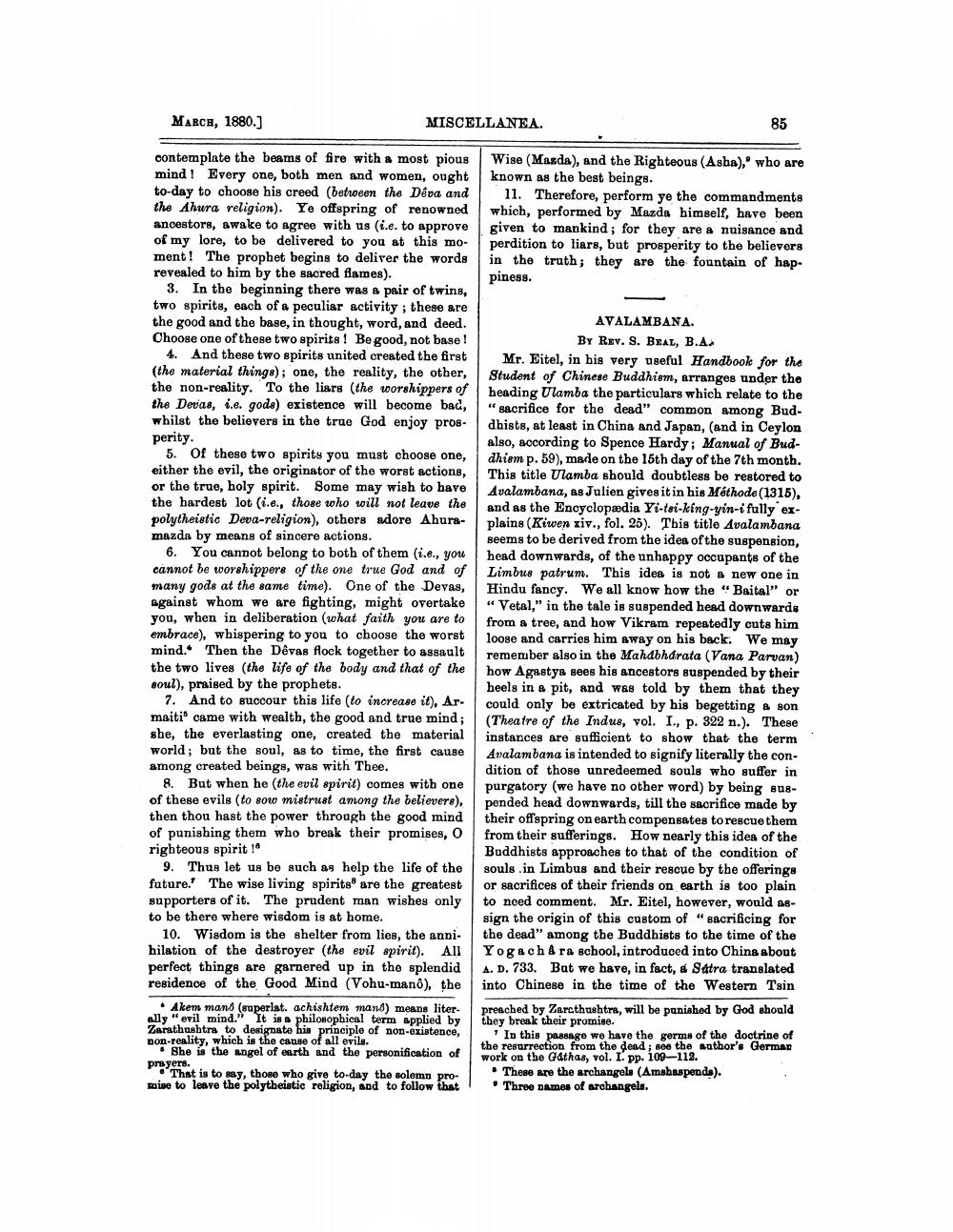________________
MARCA, 1880.]
MISCELLANEA.
85
Wise (Mazda), and the Righteous (Asba)," who are known as the best beings.
11. Therefore, perform ye the commandments which, performed by Mazda himself, have been given to mankind; for they are a nuisance and perdition to liars, but prosperity to the believers in the truth; they are the fountain of happiness.
contemplate the beams of fire with a most pious mind! Every one, both men and women, ought to-day to choose his creed (betroeen the Deva and the Ahura religion). Ye offspring of renowned ancestors, awake to agree with us (i.e. to approve of my lore, to be delivered to you at this mo- ment! The prophet begins to deliver the words revealed to him by the sacred flames).
3. In the beginning there was a pair of twins, two spirits, each of a peculiar activity; these are the good and the base, in thought, word, and deed. Choose one of these two spirits! Be good, not base!
4. And these two spirits united created the first (the material things); one, the reality, the other, the non-reality. To the liars (the worshippers of the Devas. e. gode) existence will become bad, whilst the believers in the true God enjoy prosperity.
5. Of these two spirity you must choose one, either the evil, the originator of the worst actions, or the true, holy spirit. Some may wish to have the hardest lot (i.e., those who will not leave the polytheistic Deva-religion), others adore Ahuramazda by means of sincere actions.
6. You cannot belong to both of them (i.s., you cannot be worshippers of the one true God and of many gods at the same time). One of the Devas, against whom we are fighting, might overtake you, when in deliberation (what faith you are to embrace), whispering to you to choose the worst mind. Then the Dêvas flock together to assault the two lives (the life of the body and that of the soul), praised by the prophets.
7. And to fuocour this life (to increase it), Ar. maiti came with wealth, the good and true mind; she, the everlasting one, created the material world; but the soul, as to time, the first cause among created beings, was with Thee.
8. But when he (the evil spirit) comes with one of these evils (to sow mistrust among the believers), then thou hast the power through the good mind of punishing them who break their promises, O righteous spirit !
9. Thus let us be such as help the life of the future.' The wise living spirits are the greatest supporters of it. The prudent man wishes only to be there where wisdom is at home.
10. Wisdom is the shelter from lies, the anni- hilation of the destroyer (the evil spirit). All perfect things are garnered up in the splendid residence of the Good Mind (Vohu-mano), the
• Akem mand (superlat. achishtem mand) means literally "evil mind." It is a philosophical term applied by Zarathashtra to designate his principle of non-existence, non-reality, which is the cause of all evils.
She is the angel of earth and the personification of
That is to say, those who give to-day the solemn promise to leave the polytheistic religion, and to follow that
AVALAMBANA.
By Rev. S. BEAL, B.A. Mr. Eitel, in his very useful Handbook for the Student of Chinese Buddhism, arranges under the heading Ulamba the particulars which relate to the " sacrifice for the dead" common among Buddhists, at least in China and Japan, (and in Ceylon also, according to Spence Hardy; Manual of Buddhism p. 59), made on the 15th day of the 7th month. This title Ulamba should doubtless be restored to Avalambana, as Julien gives it in his Méthode (1315), and as the Encyclopædia Yi-tsi-king-yin-ifully explains (Kiwen xiv., fol. 25). This title Avalambana seems to be derived from the idea of the suspension, head downwards, of the unhappy occupants of the Limbus patrum. This idea is not a new one in Hindu fancy. We all know how the "Baital" or
Vetal," in the tale is suspended head downwards from a tree, and how Vikram repeatedly cuts him loose and carries him away on his back. We may remember also in the Mahabharata (Vana Parvan) how Agastya sees his ancestors suspended by their heels in a pit, and was told by them that they could only be extricated by his begetting a son (Theatre of the Indus, vol. I., p. 322 n.). These instances are sufficient to show that the term Analambana is intended to signify literally the condition of those unredeemed souls who suffer in purgatory (we have no other word) by being subpended head downwards, till the sacrifice made by their offspring on earth compensates to rescue them from their sufferings. How nearly this idea of the Buddhists approaches to that of the condition of souls in Limbus and their rescue by the offeringe or sacrifices of their friends on earth is too plain to noed comment. Mr. Eitel, however, would 28sign the origin of this custom of "sacrificing for the dead" among the Buddhists to the time of the Yogach & ra school, introduced into China about A. D. 733. But we have, in fact, & Satra translated into Chinese in the time of the Western Tsin preached by Zarcthushtra, will be panished by God should they break their promise.
In this passage we have the germs of the doctrine of the resurrection from the dead; see the author's German work on the Gathas, vol. I. pp. 109-112.
• These are the archangels (Amabuspenda). T hree Dames of archangels.
prayers




